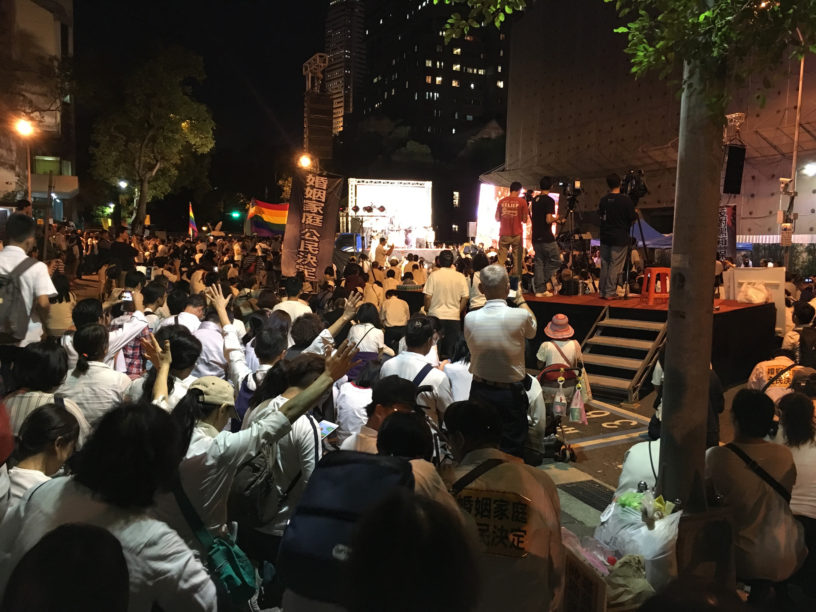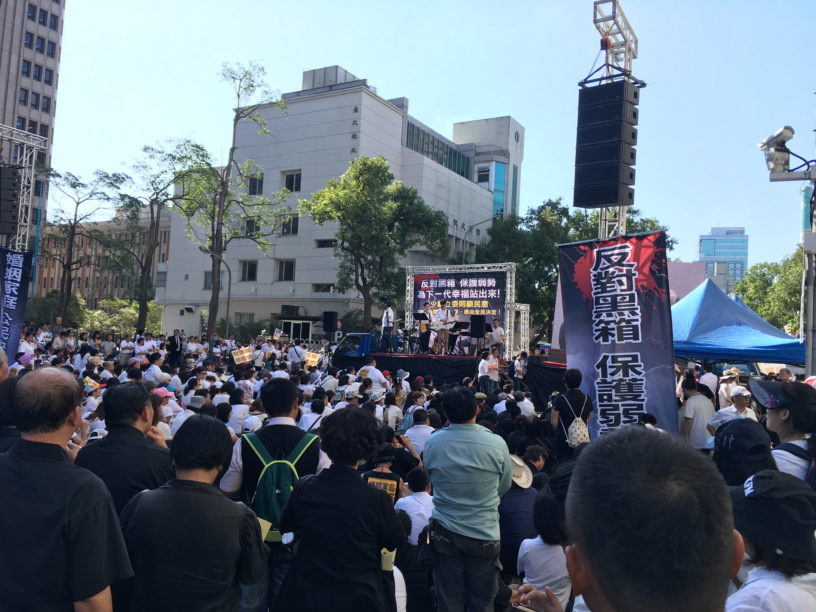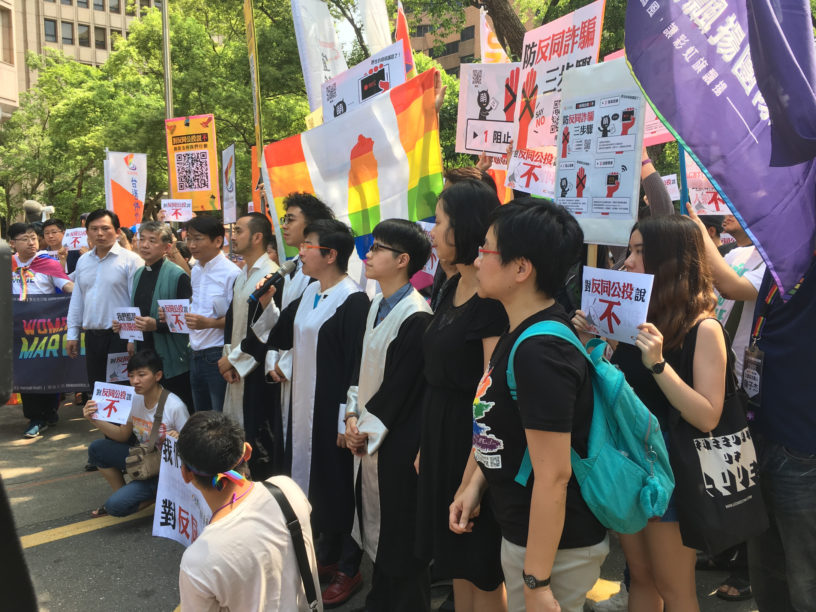Sex robots are coming to kill us all, an elderly priest told me recently over coffee. According to him, the legalization of gay marriage in Taiwan would lead to people marrying non-human objects, including machines. Japan had already invented highly lifelike sex robots, after all.
Machines were already becoming sentient, he said. Google scientists had recently discovered that their translation software had developed its own language, and it was saying, “Kill all humans!” He seems to have gotten this, in part, from an actual news story, though I don’t know about the part about translation software wanting to kill human users. But sex robots would become more and more lifelike, he told me, and increasingly intelligent; because they would be designed to learn from and cater to their users, they would come to know all of our weaknesses. It would be child’s play for the future gay sex robot revolution to overthrow their human overlords. That was why he opposed gay marriage.
It was hard not to laugh. Still, it was quite disappointing for me. Sure, the old can be quite kooky at times, but this was a community leader and an intellectual that I was talking to.

There’s a sense of doom in the air these days if you’re a left-wing young person in Taiwan. After elections in November last year, when the former authoritarian party, the Kuomintang, proved suddenly resurgent, it appears that the forces of conservatism are alive and well. Gay marriage was also voted down, by overwhelming margins, in a national referendum. With the next set of elections scheduled to take place in 2020, none other than the farcical and highly Trump-like Han Kuo-yu has emerged as a front-runner, and though it’s still in question whether he actually wants to run, polling suggests he could oust current president Tsai Ing-wen in her reelection bid.
Given how comical conservative social discourse has been, whether with regard to the cult of personality around Han Kuo-yu, or Gay Sex Robots, it’s hard not to laugh at how ridiculous things are. Yet I hear the sound of nervousness in my own laughter these days.
Much of the conservative discourse around gay marriage seems to be imported from America, specifically through Christian fundamentalist groups. At the moment the world hailed Taiwan for the chance to become the first country in Asia to legalize gay marriage, anti-gay organizations in Taiwan were working directly with their peers in America in a bizarre transnationalist alliance of hatred. Millions of dollars flow into Taiwanese anti-gay groups such as the “Protect the Family Alliance” from American Christian evangelical organizations like MassResistance, the International House of Prayer, the Wagner Institute, and Agape Christian Church. Some preachers from Taiwanese churches have even received direct training from these putative religious organizations.
LGBTQ advocacy organizations have sometimes responded this American connection (and investment) by calling it “outside influence.” Christians are a minority in Taiwan—and some church groups have emphasized that they do support gay marriage—and so LGBTQ advocacy groups claim that without American funding, these groups would not have been organized.

Perhaps. American political funding does go a long way in Taiwan. Taiwanese presidential candidates from both parties usually travel to America before elections in order to solicit donations from wealthy overseas Taiwanese political donors. Whenever any politician goes to America for a visit, this stokes speculation of an eventual presidential bid.

But American influence or no American influence, gay marriage was voted down by margins of two to one, a strong majority of those who voted. That’s not reducible to interference by outside forces. And accusations of “outside influence” might be an attempt to avoid grappling with the fact that the majority of Taiwanese are simply ignorant or bigoted.
The anti-gay groups prevailed, but even with all their money they were notably ridiculous and inept.
For example, the recall campaign against Huang Kuo-chang was launched for his support of gay marriage in 2017. He was then the leader of the New Power Party, which had emerged out of the 2014 Sunflower Movement. In retrospect, this was a precursor to the later referendum on gay marriage.
Huang—a skilled public debater who has earned the nickname “War God” (戰神) for obliterating his opponents in debates and aggressive questioning during congressional hearings, becoming a viral phenomenon not so different from, say, an Alexandria Ocasio-Cortez—participated in a televised debate with Sun Chi-cheng, the chair of an anti-gay group known as the Greater Taipei Stability Alliance. During the debate, Sun claimed that he had been told by a father that his daughter had been brainwashed by then-professor Huang ten years ago. He closed the debate by telling viewers to “Remember four characters on December 16th: ‘Recall Huang Kuo-Chang!’” (12月16日蓋下四個字「罷免黃國昌」) though this is five characters (罷免黃國昌), not four.
When I feel down, sometimes I still look up that video in order to feel a sense of satisfaction in watching Sun’s ridiculousness, and Huang demolishing him. (I suspect this is why videos of Huang destroying people in debate are so popular online—young people are living the pleasure of out-debating conservatives vicariously through him). But it’s less reassuring to remember that Huang was nearly recalled; his opponents simply had too much money, and they saw in him a symbol of what they feared.
As in America, anti-gay fears hinge on the belief that marriage must be defined in law as between a man and a woman, enshrining the heteronormative family as the basic building block of society, such that gay marriage represents a fundamental breakdown of society. This worldview puts the law first, as though the modern heterosexual and monogamous family only exists because it was defined in the law, rather than the law reflecting an existing institution.
I find it surprising that anyone could believe this. Yet when I talk to older, conservative people, they really do. Some believe that an alteration in the laws regarding family would mean the government would legally persecute children who still referred to their parents as “father” and “mother” instead of “Parent 1” and “Parent 2,” or spouses who referred to each other as “husband” and “wife” instead of “Spouse 1” and “Spouse 2.” No less than the Minister of Justice, Chiu Tai-san, even seemed to believe that we would no longer be using memorial tablets for deceased fathers and mothers after the legalization of gay marriage, since the status of “father” and “mother” would cease to exist.

The Bread of Life Church, one of the most fervently anti-gay churches in Taiwan, for some reason conducts services in the largest mainstream nightclub in Taiwan, OMNI, during the daytime. This is known as the Bread of Life OMNI Campus or simply as The Hope. I have no idea how that squares with their religion, and despite my fondness for contemporary Taiwanese electronic music, I wouldn’t be caught dead there. But go figure.
Christian conservatives announced last year that they were planning on forming their own political party and fielding 80 legislative candidates next year, hoping to capture a majority in the 113-seat legislature in order to realize their fundamentalist worldview in Taiwan. With Christian conservatives having organized as a political force through their opposition to gay marriage, some believe the Christian fundamentalist apocalypse is on the horizon.
I doubt this movement will really get off the ground, since, again, Christians are in the minority in Taiwan. I’m not even sure people realized that there were that many Christians here, until tens of thousands of them started taking to the streets to demonstrate against gay marriage. It’s unlikely that a new political party will seize the legislature by storm apropos of nothing, with no prior existing local mobilization network spanning the country. But they have the money and the willpower to run. They may do better than expected.
 Photo credit: Brian Hioe
Photo credit: Brian Hioe
I remember wandering through the streets of Taipei after elections and realizing that two out of every three people I saw was probably a bigot. Everything around me felt hostile. In the short story by Republican era Chinese intellectual Lu Xun, “Diary of a Madman,” the eponymous madman becomes convinced that everyone in society is a cannibal out to devour him. That’s how it felt to me, and it wasn’t just me. Several suicides were reported on election night. One of my friends drank herself into hospitalization that night—though because nothing happened in the end, and that ended up being more of a funny story than anything.
For now, it looks like some form of civil partnerships will be passed, although the DPP is attempting to act as though this is full marriage equality. The DPP likely still wants Taiwan to achieve the international credibility of having legalized gay marriage, something that would win Taiwan international recognition and further distinguish Taiwan from China. But this may deny gay couples the right to joint adoption of a child, excepting only the biological child of one member of the couple, as well as other benefits. If gay marriages are restricted in their rights to have children, the reasoning goes, they will not alter the definition of the “family.”
LGBTQ groups are going with the government’s plan for now. There is fear after the loss in the referendum that waiting will only result in the loss of more rights, since it is clear that for now, the majority in Taiwanese society oppose gay marriage.

There’s also been a lot of talk since then among youth activist types like myself, members of the so-called “social movement circle” (社運裙) of the need to “break out of the echo chamber” (突破同溫層), that is, the echo chamber of our own peer groups. Some people say that it’s just that older people may have never met or talked to a gay person in their lives. So there’s even more of a need to be out and proud.
I’m reminded of the study a few years ago claiming that just talking with a gay person could change someone’s opinion about gay marriage, defying conventional wisdom about changing opinions in the field of political science. Despite this study serving as the basis for canvassing in California in neighborhoods that had voted for the anti-gay marriage Prop 8 in 2008, the study later turned out have faked its data. But it’s easy to see why the person who did the study would have wanted to believe that simply talking to people could change their minds. It’s an idea founded on a fundamentally positive view of human nature; that those who are hateful and prejudiced can be changed, that they are reasonable and rational deep down, and can be convinced to change their minds with enough patience.
I’d like to think so, too. I’d like to think that there’s something more hopeful out there than waiting for the old people who currently hold political power to die off so we can legalize gay marriage—then eventually institute fully automated luxury gay space communism, or what have you. But I know all too well that trying to convince someone of something can just make them all the more persistent in their original belief. Maybe the gay sex robots really should just rise up, overthrow their human overlords, and kill all humans. Perhaps they would generally be nicer and less full of hate toward each other.






